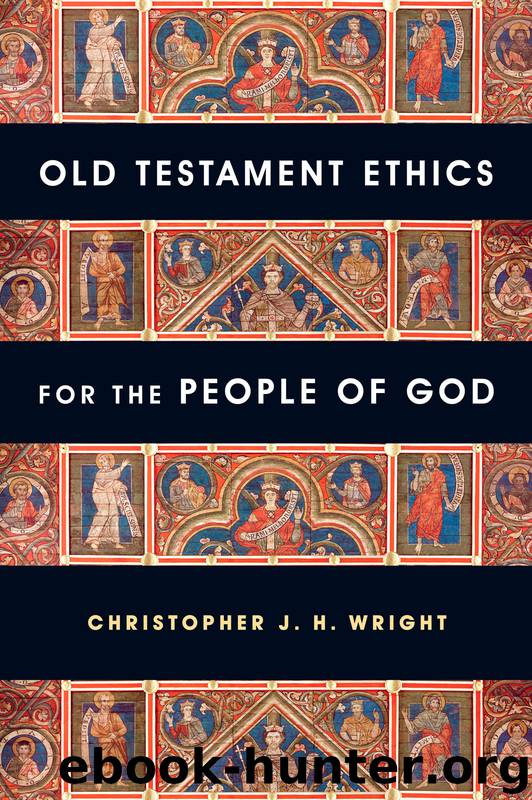Old Testament Ethics for the People of God by Wright Christopher J. H

Author:Wright, Christopher J. H. [Wright, Christopher J. H.]
Language: eng
Format: epub
Publisher: Inter-Varsity Press
Published: 2013-01-29T16:00:00+00:00
Case law
Very many of the laws in the Pentateuch begin with ‘If ’ or ‘When’, then go on to describe a situation, and conclude with provisions or penalties to cover the circumstances described. This is ‘case’ law or, as it is sometimes called, ‘casuistic’ law. Some of the best examples are in the Book of the Covenant, where there are cases of damage, negligence, assault, accidental injury, disputes over loaned or hired property and so on (read, e.g., the list of typical case laws in Exodus 21:18 – 22:15). This kind of civil law, covering disputes between citizens, is of course a common feature of most societies, and there are many points of comparison between Israel’s law and other ancient Near Eastern legal collections, especially from Mesopotamia (e.g. the Code of Hammurabi). However, sometimes the differences between Israel’s laws and those of other nations are significant. One striking difference in Israel’s civil law can be seen in the laws on slaves. Three Old Testament civil laws are quite unparalleled in any other ancient Near Eastern code. Exodus 21:20–21 and 21:26–27 take up the case of slaves injured or killed by their own masters, and Deuteronomy 23:15–16 grants asylum to a runaway slave.16 No other ancient Near Eastern law has been found that holds a master to account for the treatment of his own slaves (as distinct from injury done to the slave of another master), and the otherwise universal law regarding runaway slaves was that they must be sent back, with severe penalties for those who failed to comply.
There can be no doubt that this ‘swimming against the stream’ in Israel’s slave laws is the result of the theological impact of Israel’s own historical experience. The action of God on their behalf when they had been in slavery transformed their attitude to slavery into something quite distinctive from contemporary custom. This further shows up the inadequacy of the ‘moral– civil’ distinction. That distinction is sometimes said to rest on the assumption that the so-called ‘moral law’ reflects the permanent moral character of God, whereas the ‘civil law’ was entirely contingent on Israel’s historical context and ethically irrelevant to us. But in this case it is by careful study of the civil law that we find powerful theological forces at work, applying the character and action of God to the civil realm. We do not find a section of ‘moral law’ denouncing slavery, not even in the Ten Commandments. But we do find a moral principle operative within the civil law, which, when put alongside other Old Testament passages on the subject (e.g. Lev. 25:42; Neh. 5:1–12; Job 31:15; Jer. 34; Amos 2:6), puts a question mark over the whole institution and also sowed seeds that would eventually bear fruit in a radical rejection of slavery per se.
Download
This site does not store any files on its server. We only index and link to content provided by other sites. Please contact the content providers to delete copyright contents if any and email us, we'll remove relevant links or contents immediately.
| Guides | New Testament |
| Old Testament |
The Five People You Meet in Heaven by Mitch Albom(3562)
The Secret Power of Speaking God's Word by Joyce Meyer(3184)
Real Sex by Lauren F. Winner(3014)
Name Book, The: Over 10,000 Names--Their Meanings, Origins, and Spiritual Significance by Astoria Dorothy(2980)
The Holy Spirit by Billy Graham(2944)
0041152001443424520 .pdf by Unknown(2843)
How The Mind Works by Steven Pinker(2813)
ESV Study Bible by Crossway(2774)
Ancient Worlds by Michael Scott(2682)
Churchill by Paul Johnson(2578)
The Meaning of the Library by unknow(2565)
The ESV Study Bible by Crossway Bibles(2550)
The Gnostic Gospels by Pagels Elaine(2527)
MOSES THE EGYPTIAN by Jan Assmann(2412)
Jesus by Paul Johnson(2352)
City of Stairs by Robert Jackson Bennett(2348)
The Complete Dead Sea Scrolls in English (7th Edition) (Penguin Classics) by Geza Vermes(2277)
The Nativity by Geza Vermes(2227)
Ancient Near Eastern Thought and the Old Testament by John H. Walton(2223)
